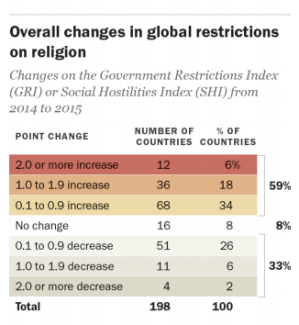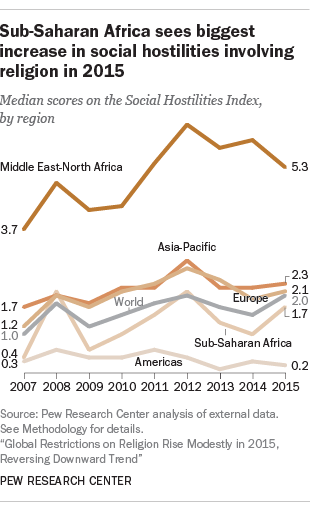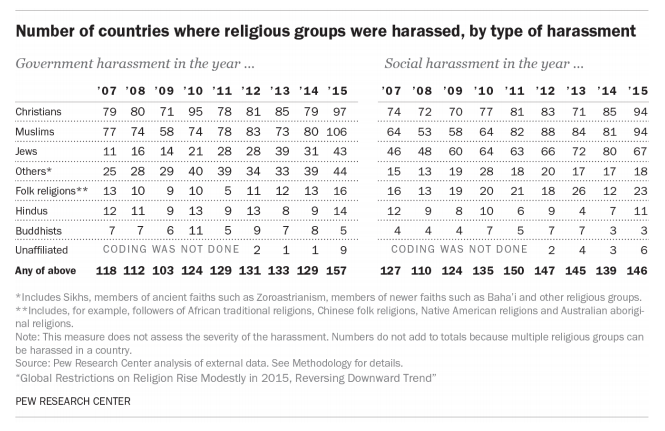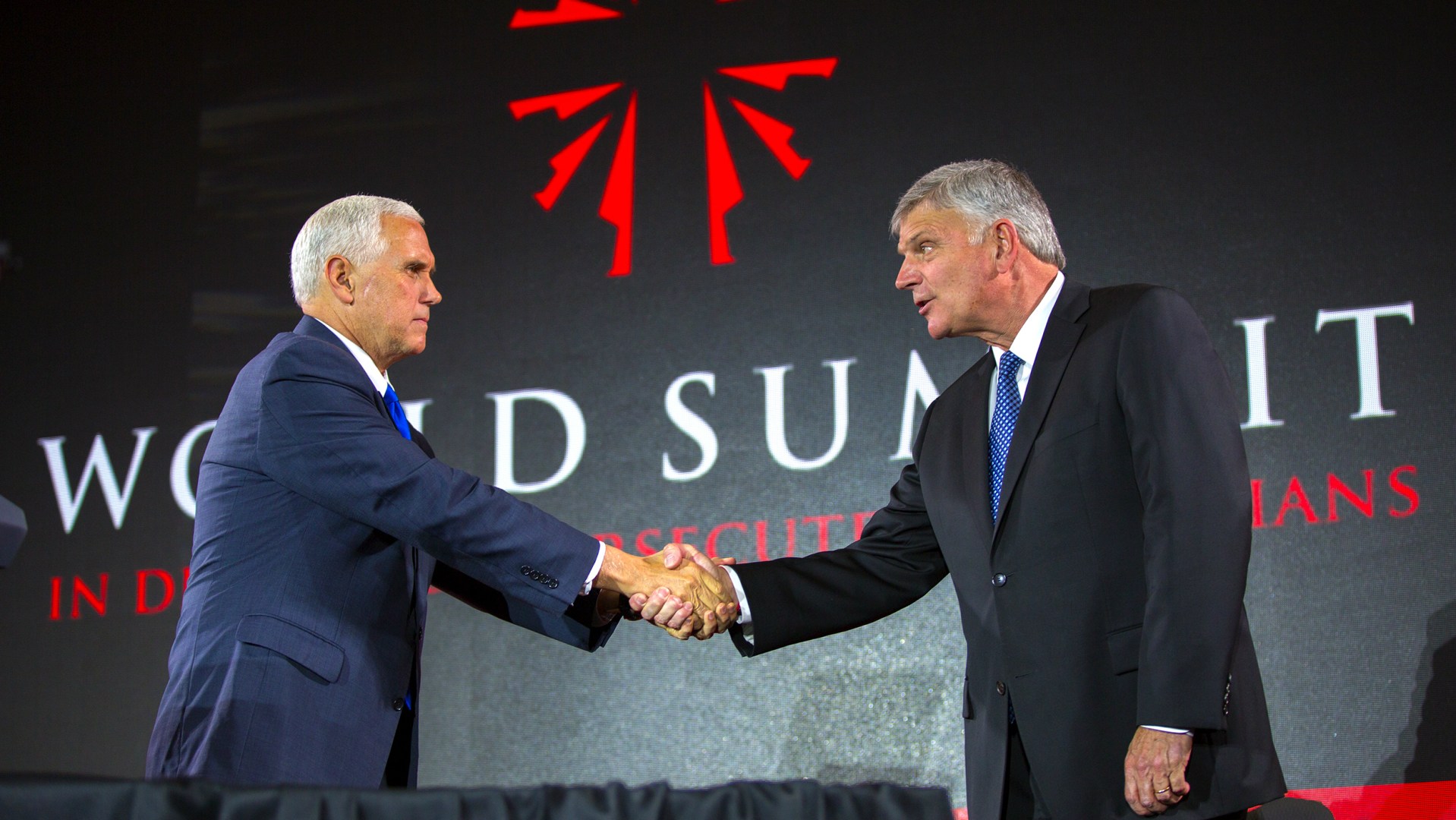Franklin Graham condemned the “Christian genocide” that’s killing “over 100,000 a year because of their faith in Christ” at a Washington, D.C., gathering of 600 persecuted believers and their advocates from 130 countries.
“I am sure the number of Christians who are in prison or martyred each year would stagger our mind if we really knew what the total number really was,” Graham told the opening session of the inaugural World Summit in Defense of Christians, reports Religion News Service. “And it would send us to our knees in sorrow and in prayer.”
 Billy Graham Evangelistic Association
Billy Graham Evangelistic AssociationThe figure of 100,000 martyrs that Graham cited originates from the Center for the Study of Global Christianity (CSGC), and includes all Christians “who have lost their lives prematurely, in situations of witness, as a result of human hostility.”
This definition is broad. For example, it includes about 20 percent of the 4 million people killed in the Democratic Republic of the Congo’s civil war, which significantly skews the 10-year average that the number represents.
It’s also highly debatable, as CT has reported. By comparison, Open Doors, a leading advocate for the persecuted church which verifies every death through witnesses when possible, counted just 1,207 Christians killed for faith-related reasons during the reporting period for its 2017 World Watch List. The prior year, it reported 7,000 martyrs.
However, what is not in dispute is that religious freedom violations have hit record highs in recent years, as extensively documented in the latest reports from Open Doors, the US Commission on International Religious Freedom, the US State Department, and Under Caesar’s Sword, among others. (The current debate: Does the US belong on such lists?)
A leading cause has been ISIS attacks on Christians, which advocates argued was “genocide”, and the State Department finally agreed.
Vice President Mike Pence also addressed the noteworthy gathering, decrying the genocidal actions of ISIS and pledging that the US would prioritize the protection of persecuted Christians (another current debate). Baptist Press offers more details on the DC summit.

The latest study from the Pew Research Center found that government restrictions and social hostilities regarding religion in 2015 (the latest year with data available) were actually down a bit from record highs in 2012, although up significantly from 2007 when Pew began keeping track.
Of the 198 countries in the study, 40 percent had high or very high levels of restrictions in 2015, up from 34 percent the year before.
The most noteworthy aspect of Pew’s report is that it breaks those restrictions into two groups—those passed by governments and those enforced by society.
Governmental restrictions include items such as blasphemy laws, bans against evangelism, and preventing religious groups from constructing houses of worship.
Societal restrictions include incidents such as the Palm Sunday bombings of two Coptic Orthodox churches in Egypt, violence against Christians in refugee camps, and the Boko Haram insurgency that killed more than 4,000 Christians in 2015.
Overall, more countries saw increases than decreases during the reporting period.
Governments harassed religious groups in 53 percent of the countries Pew surveyed, up from 43 percent in 2014 and 48 percent in 2013. Governmental use of force against religious groups was up also: 42 percent of countries used force against a religious group between 1 and 200 times in 2015, up from 30 percent in 2014.

While most of that governmental harassment or use of force happened in sub-Saharan Africa or the Middle East, Europe’s numbers are also on the rise. More than half of European countries increased governmental harassment of religious groups between 2014 and 2015.
In 2014, just eight European countries had used force against a religious group. In 2015, the number rose to 17.
Those incidents, which include verbal as well as physical abuse, were sometimes “related to Europe’s incoming refugee population,” Pew stated. More than half (54%) of the 1.3 million refugees applying for asylum in Europe in 2015 came from the war-torn, Muslim-majority countries of Syria, Afghanistan, and Iraq.
The influx introduced several problems. Not only are Muslims in Europe discriminated against and feared, but Christians in majority-Muslim refugee camps are also threatened, insulted, and attacked.

The two European countries that saw force used most were France and Russia. France started 2015 with a mass shooting at the Charlie Hebdo magazine office in Paris; the year ended with another 130 killed in coordinated terrorist attacks across the city.
After both incidents, the government cracked down with late-night raids on Muslim homes and a strict enforcement of the ban on wearing face coverings in public spaces or government buildings. The response drove up the country’s number of forceful incidents. (CT asked experts what they thought of the ban.)
Russia’s numbers were also high. Pew took stock of the country before it outlawed evangelism outside of churches, but after it annexed Crimea in 2014. Crimean religious groups had to re-register with the government; of the 1,546 religious groups active in Crimea before the annexation, just 14 were left in 2015.
Russia continues to tighten religious restrictions; this month, the Supreme Court decided to label Jehovah’s Witnesses an extremist group and ban its activities (putting Russian evangelicals in a tight spot.)
Along with government restrictions, social hostilities in Europe also rose in 2015. Christians were the victims in 21 countries, up from 17 in 2014.
But social incidents against Muslims rose more; incidents were recorded in 32 countries, up from 26 countries in 2014. In France and Spain, mosques were attacked after the Charlie Hebdo shooting. France reported that hate speech, vandalism, and violence against Muslim individuals more than tripled in 2015.

But even though European government and social hostility toward religious groups grew in 2015, the region still falls far below the Middle East–North Africa.
Among the 25 most populous countries, “Egypt had the highest levels of government restrictions in 2015, while Nigeria had the highest levels of social hostilities,” Pew stated.
Nigeria’s social hostilities stem from Boko Haram, which attacked people in Cameroon, Niger, and Chad, as well as in Nigeria in 2015. In one attack, a suicide bomber was disguised in a burqa.
“Not only did these incidents contribute to an increase in the median level of social hostilities involving religion in sub-Saharan Africa in 2015, but also government policies and actions in response to the Boko Haram threat caused a rise in the median level of government restrictions,” Pew stated. For example, the governments of Cameroon, Niger, and Chad, along with the DRC, restricted the use of Islamic veils in public spaces.
“Compared with other regions, sub-Saharan Africa experienced the largest increases in both government restrictions and social hostilities involving religion in 2015,” Pew stated.
Overall, government restrictions rose worldwide; fewer countries are listed in the “low” or “high” categories, while the “very high” group grew from 16 countries to 23. The new additions: Morocco, Iraq, Algeria, Brunei, Eritrea, Singapore, Mauritania, and Vietnam.
The same number of countries stayed on the list of countries experiencing “very high” social hostilities, though Lebanon and Sri Lanka dropped off the list and Russia and Egypt were added. The number in the “low” category dropped from 98 to 87.
Sixteen countries had significant changes; of those, 12 saw increases in social hostility and four saw decreases. The largest increases were in Switzerland, the Philippines, Nepal, and Niger. In Niger, president Mahamadou Issoufou’s support of the victims of the Charlie Hebdo attack sparked two days of protest, during which 10 people were killed, 177 injured, and 70 Christian churches were destroyed.
Christians were harassed in 128 of the 198 countries Pew surveyed, up from 108 in 2014. Muslims were harassed in 125, up from 100 the year before.
Christians are “targeted by the highest number of governments in the Asia-Pacific region, where 33 countries harassed Christians in 2015,” Pew stated.

CT extensively reports on religious freedom and persecution, including how Open Doors’ annual World Watch List “aims for effective anger.”















